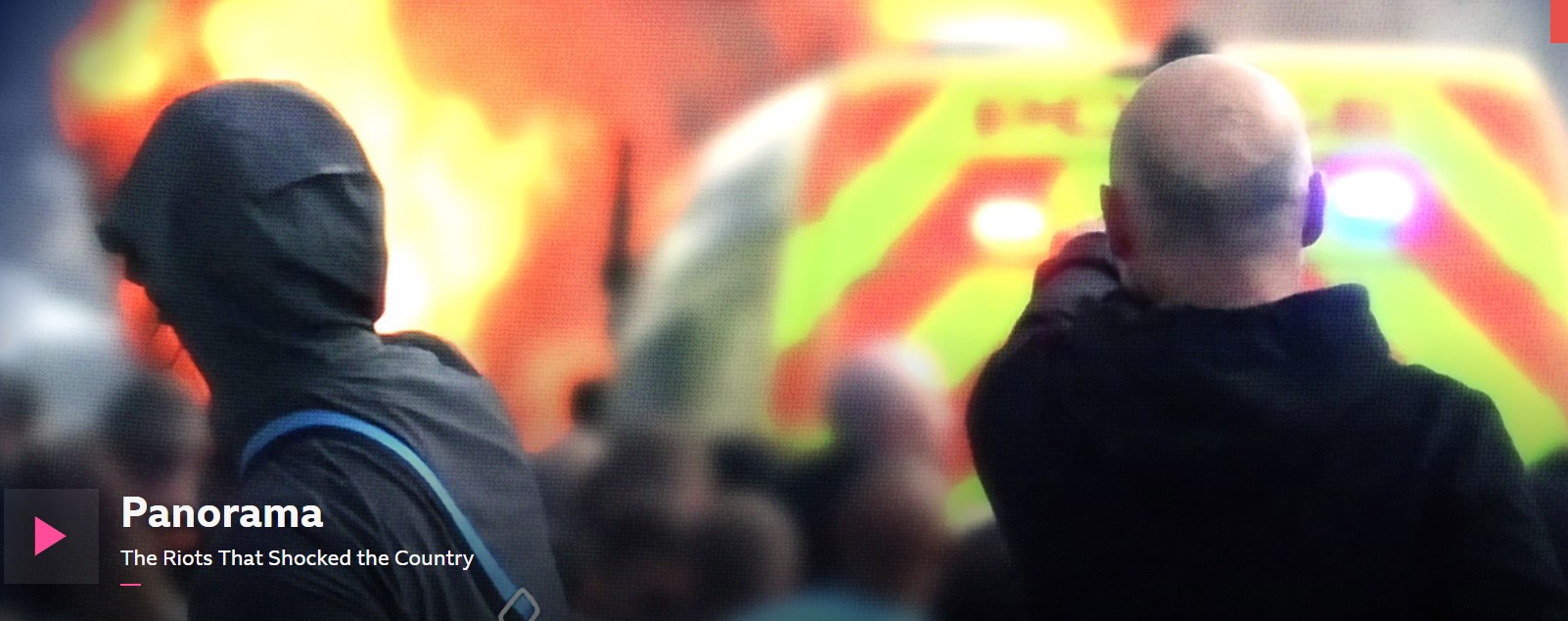Review by Mark Langabeer, Hastings and Rye Labour member
The BBC’s Panorama programme this week, looked at the riots organised by the far right in 23 towns and cities in England and Northern Ireland, after the murders of three young children in Southport. As the programme explained, misleading information was circulated on social media, claiming that the suspect was an asylum seeker and Muslim.
Nigel Farage, owner and leader of Reform UK, stoked the flames by suggesting that the police were “witholding information” about the murders. The attack on a mosque in Southport was quickly followed by far right riots in other towns and cities, targetting hotels where asylum seekers were believed to be staying and at Muslum communities in general.
The Panorama reporter, Darragh Maclntyre, spoke of the scenes in Liverpool, where a library of all places was attacked. He interviewed Steve Rotherham, the Labour Mayor for the City, who condemned the attack, but felt that the underlying causes for the rioting was that a layer of the population felt ‘left behind’ and that immigrants were being made a scapegoat for the social and economic problems faced by many in Liverpool. Here, the programme reported, one in three children are growing up in poverty and 15,000 people are on the council house waiting list.
Rotherham also said that there was no extra money coming, so the Council needed to find ‘innovative’ ways of boosting economic growth in the area. Prime Minister, Keir Starmer, announced only that the courts should give harsher sentences for those involved in the riots and greater police protection for those who had come under attack. But it was noticeable that he made no attempt to explain the underlying causes of the riots or offer financial support to the areas were affected by the disturbances.
Food bank use tripled in six years
Panorama went on to show scenes in Middlesbrough, where a gang of youths had smashed the windows of people who were believed to be ‘foreign’. Here, Maclntyre interviewed an academic from a nearby university, who said that he was not surprised to witness such scenes because Middlesbrough had one of the highest rates of unemployment in the UK, and that the number of people using food banks had tripled in the last six years.
Panorama noted that around three million people have entered the UK in the last decade and this has created a perception among some that local people have been pushed further down the social ladder when it comes to jobs, housing and access to public services.
That is certainly a view cyncially exploited and propagated by the likes of Nigel Farage and Reform UK. However, another contributor to the programme argued that the main driver for immigration has been staff shortages, particularly in the lowest paid sectors like social care.
The Panorama reporter noted that there wasn’t any one single group that organised these anti-Muslim and anti-asylum-seeker attackes. However, there are figureheads like Stephen Yaxley-Lennon, who styles himself ‘Tommy Robinson’, and who is the former leader of the English Defence League.
He has taken to social media to promote his rascist opinions and he has around a million followers on X. Although he was banned by Twitter in 2018 , he was reinstated by new owner, billionaire Elon Musk, when he bought the the social media platform.
Tories and newspapers have fanned the flames of hatred
Like Farage, Musk has also fanned the flames of hatred towards migrants, claiming, for example, that UK police operated a ‘two -tier’ system: ‘soft’ on minority communities and harsh on rioters. He even suggested that the UK was heading towards civil war. We might add add that the Tories and their friends in many national newspapers have also fanned the flames of hatred as well. There is hardly a week that goes by without some new lurid headline about ‘small boats’.
Maclintyre himself attended an event that was planned by the far- right in Liverpool, but he reported that instead of far-right supporters, the place was full of anti-racists who had come to support the rights of Muslims and asylum seekers to live in Britain without fear of attacks. He reports that the actual supporters of the far-right were rather thin on the ground on this occasion.
In my view, the far-right really are still thin on the ground in terms of their political support. However, should the Starmer government fail to address the underlying reasons for the riots – more especially, the reasons for Reform UK getting four million votes in the general elections – then the far-right will emerge as a stronger political force.
They might masquerade as a ‘respectable’ political party like Reform UK, but their long-term aim would not be limited to asylum seekers and Muslims, but the destruction of the rights that have been fought for and won by the labour movement in the past.
The episode of Panorama [top picture] is still available on BBC i-player and can be found here.



